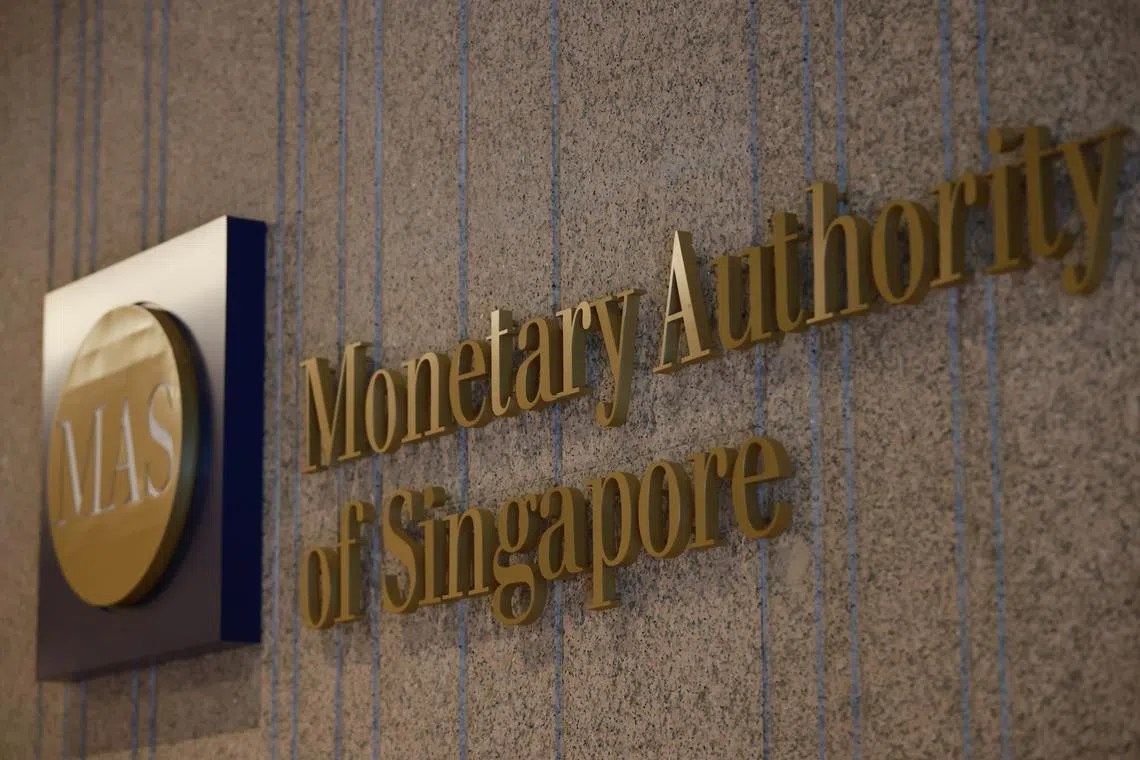Financial sector development fund top-up will fuel pursuit of new opportunities in AI and more: MAS
Sign up now: Get ST's newsletters delivered to your inbox

For the financial year ended March 31, 2023, the fund had total net assets worth $1.08 billion and disbursed $235 million in grants.
PHOTO: ST FILE
Follow topic:
SINGAPORE - A $2 billion boost to a fund for developing the financial sector announced in Budget 2024 will give Singapore’s central bank a stronger hand to capture new opportunities in sustainability, artificial intelligence, technology and innovation.
The Monetary Authority of Singapore (MAS) also said the top-up to the Financial Sector Development Fund (FSDF) would give it more resources to “anchor” capabilities across banking, capital markets, asset management and insurance.
For the financial year ended March 31, 2023, the FSDF had total net assets worth $1.08 billion and disbursed $235 million in grants.
A spokeswoman for the MAS said in response to queries from The Straits Times: “The top-up will enable MAS and the Institute of Banking and Finance to step up our talent development initiatives, upskill Singaporeans and equip the workforce to take on these opportunities. This will help strengthen the competitiveness of our financial centre and create good jobs for locals.”
In his Budget speech on Feb 16,
The FSDF was set up in 1999 to support the development of Singapore as a financial centre, and is controlled and administered by the MAS.
Over the years, it has supported key initiatives in talent development, industry capabilities, fintech, innovation and consumer education, the MAS spokeswoman said.
During the five-year period from 2018 to 2022, FSDF training support schemes provided funding for more than 250,000 training places for Singaporeans to gain new competencies, she said.
The fund also supported initiatives to deepen industry capabilities across asset classes. For instance, in the foreign exchange (FX) market, the foreign exchange e-trading ecosystem grant scheme supports key FX liquidity providers and multi-dealer platforms in anchoring their e-FX functions in Singapore. This enhances Singapore’s FX trading and corporate treasury capabilities to serve regional demand.
In sustainable finance, the sustainable loan grant scheme and the sustainable bond grant scheme
“Such sustainable financing activity also encourages banks and sustainable advisory service providers to situate and expand capabilities in Singapore,” the MAS spokeswoman said.
The FSDF will continue to support innovation in financial services through the financial sector technology and innovation scheme, she said.
More than 30 innovation labs have been supported via the centre of excellence track since 2015, and more than 60 projects have been supported by the artificial intelligence and data analytics track.
Industry-wide technological or utility infrastructure projects will continue to be supported through the scheme. These include cross-border payment linkage initiatives to support payment needs of individuals and businesses as well as the payment linkages between Singapore and Malaysia, India and Thailand. Other examples include the pilots and trials to use distributed ledger technology for future payment infrastructure.
Support is also extended to MoneySense’s consumer education initiatives to equip Singaporeans with financial knowledge to make informed decisions.
OCBC is among the banks that have tapped the various schemes under the FSDF’s talent and leaders in finance programme.
Ms Lee Hwee Boon, head of group human resources at OCBC, welcomes the top-up, noting that skills upgrading is a priority to entrench Singapore’s position as a global business hub. “This ensures that we continue to have a deep pool of local talent to pave the way for Singapore’s future economic dynamism and success,” she said.
In 2023, OCBC invested $30 million over three years towards employee development and mobility, building on its previous investment of $50 million from 2018 to 2022.
With environmental, social and governance (ESG) issues a strategic priority for many corporate executives and boards, bankers and industry players said Singapore – which has been championing the development of green and transition finance – can carve a niche for itself.
“The International Energy Agency estimates that more than US$4 trillion (S$5.37 trillion) in annual global investment is needed for energy transition,” said Mr Matthew Chan, head of Asia-Pacific ESG engagement and sustainability at JPMorgan.
This will require new skills and capacity building and presents a strong opportunity for climate fintechs in the region, he said.
As risks associated with ESG issues are new and hard to quantify, investment managers, banks, securities firms and regulators globally face a difficult task, experts said. “In our view, Singapore’s investment to develop capabilities in ESG financial services might help the country to position itself as Asia’s carbon hub and reap the benefits of providing these services, such as carbon credit trading and ESG advisory,” said Mr Rajiv Batra, Asia equity strategist and head of the South-east Asia equity strategy team at JPMorgan.
Ms Xylia Sim, a counsel at Linklaters in Singapore, said the Republic’s status as a regional hub gives the MAS the opportunity to play a leading role in facilitating engagement between financial institutions, investors and industry players to develop transition financing instruments that are both credible and responsive to the needs of the region.
Experts also look forward to new initiatives that will be rolled out by the MAS to sustain Singapore’s fund management activities.
Mr Lennon Lee, financial services tax leader at PwC Singapore, highlighted that the success of Singapore’s variable capital companies (VCC) regime has been supported by funding from the FSDF.
The VCC is a corporate structure that has been a game changer for the fund industry here. It is popular with wealthy individuals and offices that manage the assets of multiple super-rich families.
The FSDF offers co-funding of 30 per cent of qualifying expenses, subject to a maximum grant cap of $30,000 for the incorporation or registration of a VCC.
Mr Kevin Kwek, partner of financial services at Kearney South-east Asia, is hoping for more incentives to boost bond issuance here.


